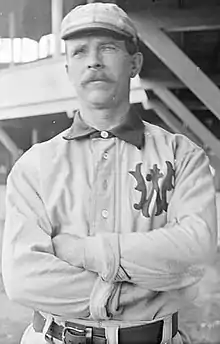Jimmy Ryan (baseball)
James Edward Ryan (February 11, 1863 – October 29, 1923), nicknamed "Pony", was an American center fielder in Major League Baseball who played eighteen seasons between 1885 and 1903, primarily for the Chicago White Stockings/Colts/Orphans (1885–1889, 1891–1900). He held the major league record for career assists by an outfielder (375) from 1900 to 1924.
| Jimmy Ryan | |||
|---|---|---|---|
 | |||
| Center fielder | |||
| Born: February 11, 1863 Clinton, Massachusetts | |||
| Died: October 29, 1923 (aged 60) Chicago, Illinois | |||
| |||
| MLB debut | |||
| October 8, 1885, for the Chicago White Stockings | |||
| Last MLB appearance | |||
| September 24, 1903, for the Washington Senators | |||
| MLB statistics | |||
| Batting average | .306 | ||
| Hits | 2,502 | ||
| Home runs | 118 | ||
| Runs batted in | 1,093 | ||
| Stolen bases | 419 | ||
| Teams | |||
| |||
| Career highlights and awards | |||
| |||
A native of Clinton, Massachusetts, Ryan enjoyed his best season in 1888, leading the National League (NL) in home runs (16), hits (182), doubles (33), total bases (283) and slugging percentage (.515), and also was second in batting average (.332), runs (115) and extra base hits (59). In that season, he also hit for the cycle on July 28. Ryan also appeared in that game as a pitcher, becoming the first player in major league history to hit for the cycle and pitch in the same game. The White Stockings beat the Detroit Wolverines 21–17. (Larry Twitchell of Cleveland pitched while hitting for the cycle on Aug. 15, 1889.)
_for_Allen_%2526_Ginter_Cigarettes_MET_DP839582.jpg.webp)
Ryan switched to the Chicago Pirates in 1890, the only season of the Players' League, and ended his career with the Washington Senators (1902–03) in the American League. In 1900, his final season in Chicago, he broke Tom Brown's record of 348 career assists by an outfielder; Tris Speaker broke his record in 1924. Ryan was a .308 career hitter with 118 home runs and 1093 runs batted in in 2014 games. As a pitcher, he compiled a 6–1 record with 43 strikeouts and a 3.62 Earned run average in 117 innings.
On the tough side, Ryan was one of the few players to punch a reporter at least twice. After his first episode, in 1887, Charlie Seymour of the Chicago Herald wrote, "Ryan slugged the magnificent Chicago reporter in Pittsburg[h] the other day." In the other, in 1892, he took exception to George Beachel of the Chicago Daily News. In the clubhouse after a game, Ryan "picked a quarrel with [Beachel], and then attacked him, using him up pretty badly. No arrests have been made." In 1896, he punched a train conductor after losing his place and his teammates had gone to bed. A conductor who intervened was "called down by Mr. Ryan, who got in one upper cut before [his longtime-captain manager Cap] Anson stopped the fun", wrote Tim Murnane of the Boston Globe.[1]
Ryan, in an article under his byline in 1905, advised against baseball as a profession, because few players last long enough in the big leagues to make money: "Baseball is not a permanent business. Look in the newspapers and you will see that a baseball player 35 years of age is considered an old man."
Ryan died in Chicago at age 60.
See also
- List of Major League Baseball career hits leaders
- List of Major League Baseball career doubles leaders
- List of Major League Baseball career triples leaders
- List of Major League Baseball career runs scored leaders
- List of Major League Baseball career runs batted in leaders
- List of Major League Baseball annual home run leaders
- List of Major League Baseball annual doubles leaders
- List of Major League Baseball career stolen bases leaders
- List of Major League Baseball players to hit for the cycle
References
- Rosenberg, Howard W. (2006). Cap Anson 4: Bigger Than Babe Ruth: Captain Anson of Chicago. Tile Books. p. 560. ISBN 978-0-9725574-3-6., p. 268.
External links
- Career statistics and player information from Baseball-Reference, or Baseball-Reference (Minors), or Retrosheet
- Jimmy Ryan at Find a Grave
| Achievements | ||
|---|---|---|
| Preceded by Sam Barkley Farmer Weaver |
Hitting for the cycle July 28, 1888 July 1, 1891 |
Succeeded by Mike Tiernan Abner Dalrymple |